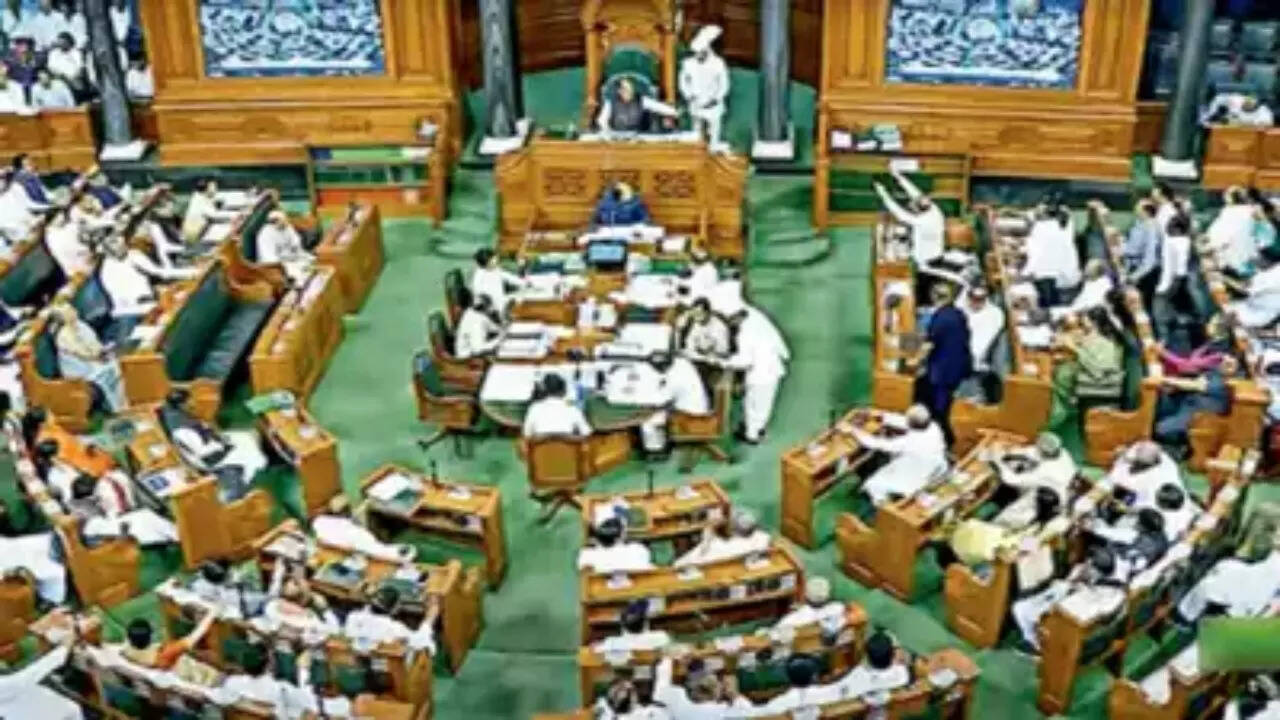[ad_1]
NEW DELHI: A new report highlights that nearly 61% of 543 MPs in the 18th Lok Sabha possess assets valued at Rs 5 crores or more and nearly 32% of members have a dynastic background, indicating entrenched familial ties in politics. Of these dynasts, 20.9% are first-generation, 72.1% are second-generation, and 6.4% are multi-generational politicians.
This report titled “Who Enters The Parliament?” by a non-profit organisation ‘Prajatantra’ analyzes the composition of the 18th Lok Sabha, focusing on how MPs enter politics and the barriers they face.It also examines gatekeeping practices and representation of women.
The data analysis shows that in the non-privileged methods of entry, party organizational politics (16.2%) is the most prominent method, followed by local politics (14.4%) and student politics (9.2%). While in the BJP, the most prominent method of non-privileged entry is local politics (16.8%), whereas in INC, it is through party organizational politics(12.1%).
According to the report, in the 18th Lok Sabha elections, for instance, the BJP fielded 110 (24.8%) candidates with dynastic backgrounds, of which 62 successfully won seats, resulting in a strike rate of approximately 56.36%. Meanwhile, the Congress fielded 99 (30.3%) candidates from dynastic backgrounds, with 43 securing seats, yielding a strike rate of approximately 43.43%.
Overall it comes through that money is the predominant barrier to entry as the data shows that nearly 61% of MPs possess assets valued at Rs 5 crores or more. This is followed by MPs from dynastic backgrounds, who make up 32%, and MPs with declared serious criminal cases, who make up 31%. Only 8.1% of the newly elected MPs successfully overcame all three barriers to entry.
Party organizational politics is the most chosen path of entry for self-made politicians, with 25.2% coming from this pathway, followed by local politics at 20.7% and student politics at 14.4%.
In a separate section in the report on women MPs it highlighted that 797 women contested the elections but only 74 were elected to Parliament. Among these MPs, 63.5% come from a family legacy or dynastic background, 14.9% emerged from local politics and 8.1% had celebrity status.
Data also shows that out of the 74 MPs 63.5% have assets worth Rs 5 crore or more and 18.9% had declared serious criminal cases against them.
“The analysis of the 18th Lok Sabha reveals a starkly limited presence of self-made politicians in parliament, with only a fraction overcoming significant entry barriers. Despite some MPs entering through non-privileged paths like local and student politics, these avenues remain predominantly gatekept by crorepatis and individuals with criminal antecedents—evidenced by over 90% of MPs being crorepatis,” the report concludes.
This report titled “Who Enters The Parliament?” by a non-profit organisation ‘Prajatantra’ analyzes the composition of the 18th Lok Sabha, focusing on how MPs enter politics and the barriers they face.It also examines gatekeeping practices and representation of women.
The data analysis shows that in the non-privileged methods of entry, party organizational politics (16.2%) is the most prominent method, followed by local politics (14.4%) and student politics (9.2%). While in the BJP, the most prominent method of non-privileged entry is local politics (16.8%), whereas in INC, it is through party organizational politics(12.1%).
According to the report, in the 18th Lok Sabha elections, for instance, the BJP fielded 110 (24.8%) candidates with dynastic backgrounds, of which 62 successfully won seats, resulting in a strike rate of approximately 56.36%. Meanwhile, the Congress fielded 99 (30.3%) candidates from dynastic backgrounds, with 43 securing seats, yielding a strike rate of approximately 43.43%.
Overall it comes through that money is the predominant barrier to entry as the data shows that nearly 61% of MPs possess assets valued at Rs 5 crores or more. This is followed by MPs from dynastic backgrounds, who make up 32%, and MPs with declared serious criminal cases, who make up 31%. Only 8.1% of the newly elected MPs successfully overcame all three barriers to entry.
Party organizational politics is the most chosen path of entry for self-made politicians, with 25.2% coming from this pathway, followed by local politics at 20.7% and student politics at 14.4%.
In a separate section in the report on women MPs it highlighted that 797 women contested the elections but only 74 were elected to Parliament. Among these MPs, 63.5% come from a family legacy or dynastic background, 14.9% emerged from local politics and 8.1% had celebrity status.
Data also shows that out of the 74 MPs 63.5% have assets worth Rs 5 crore or more and 18.9% had declared serious criminal cases against them.
“The analysis of the 18th Lok Sabha reveals a starkly limited presence of self-made politicians in parliament, with only a fraction overcoming significant entry barriers. Despite some MPs entering through non-privileged paths like local and student politics, these avenues remain predominantly gatekept by crorepatis and individuals with criminal antecedents—evidenced by over 90% of MPs being crorepatis,” the report concludes.
[ad_2]
Source link



